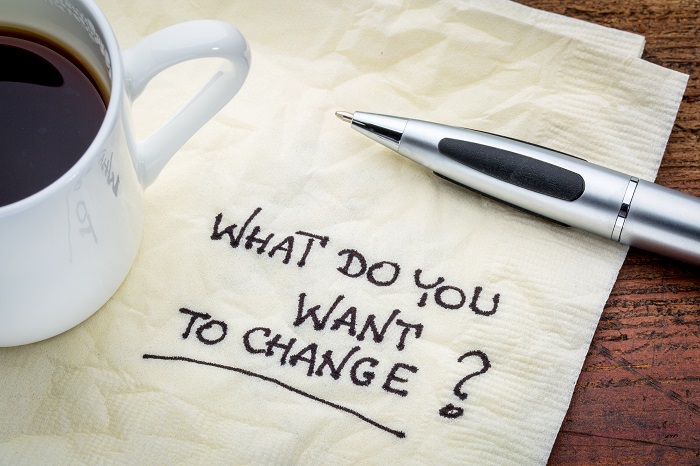The most critical challenges most of us face in life will often revolve around our ability to adapt to change. Change is a constant in our environment. It is certain, and it is often the thing that we resist the most. Human beings like constants…Constants of almost anything. The sameness is predictable and offers a sense of “security” that humans need to manage life with less stress.
However, we’ve all heard the saying that “Doing the same thing over and over again is the definition of insanity.” Is it really? Considering that improvement can only happen when change is present, I would say it is pretty important. After all, solving problems requires change.
“Change is a key element of our evolution, and change often requires a revolution in our own lives.”
I’ve been contemplating change for quite some time. I’ve dabbled in studies of change, I’ve read books that assist me in my practice to help my clients. I’ve made changes in my own lifestyle and continue to do so. I’ve resisted change, I have called for change, and I have changed, and still, change is difficult. Change is a key element of our evolution, and change often requires a revolution in our own lives.
My clients come to me when they sense a need for change, or need help solving a problem. They come to me when they are struggling with fatigue, when they want more energy, when they want to improve their hormone health, when they want to improve their thyroid health, when they want to change something that they perceive needs changing with their health. I have a fulfilling career in health & wellness because people need experts like me to educate them and help them make those changes.
Oddly enough, people often want to visit with me just once, receive some nutrition information or a new diet plan, and think that this will be effective as though just having the information alone will change things. They consult me hoping that the “event” of a nutrition consultation or a new diet plan will spark a change in their lifestyle that will become permanent. However, change doesn’t just happen overnight…Change is a journey. Often a journey of thousands of steps.
What are the steps? Which steps matter most? Can I take a shortcut? Where will this journey lead? What if I don’t have the energy for this journey? Good questions. The idea of change being a journey at first seems daunting but understanding that it is a process can really free the mind to address the problem with more clarity, allowing you to assess what resources you will need.
If you will recall, earlier I said that humans enjoy constants? What is more constant than habits? We all have them, “good” habits and “bad” habits (We like to think of habits that way). But what if we viewed our habits as neither good nor bad. What if we just looked at our habits in relationship to our goals. What if we just looked at our habits in relationship to what works well for us and the lifestyle that we want to create.
What if we re-frame our habits into that picture? What if we assess our habits and the role they can play in problem solving? What if we create new habits out of personal insight and understanding for ourselves and our behaviors? A little self-reflection and compassion can go a long way in making lasting change.
“How do we get from acknowledging the need for change to taking action? This is probably the most complex issue we face in diet and lifestyle change. ”
As I go through life, I recognize the power of healthy habits, yet things are always changing around me, and I am often aware of my need to adapt. How can we cultivate adaptability and create healthy habits at the same time? I believe that self-awareness is critical to our own ability to adapt, and it can be cultivated. Discovering intrinsic motivation toward change happens for most people when they realize that their current behaviors are at odds with their goals. In the Transtheoretical Model (TTM) of Change, this is often called PRECONTEMPLATION.
The PRECONTEMPLATION stage is the first stage of change. In my practice, I meet people in this stage when I receive inquiries about nutrition consultation. They recognize a problem that needs to be solved and this is why they call me. Unfortunately, I will never hear from some these people again. They are just thinking about making change they are not ready to truly take action.
How do we get from acknowledging our problems to taking action? This is probably the most complex issue we face in diet and lifestyle change. We understand the need for change but we flounder back and forth over the pros and cons of taking action toward change. This is often where people get stuck in just thinking and talking about “needing” to make change. This stage is of change is referred to as CONTEMPLATION.
I meet people in this stage, in my practice, when a woman decides schedule a Strategy Call or consultation with me to address her energy or hormone health. She knows there is a problem and even agrees that she needs to take action, but she has objections based on her perception of the tasteless and unappetizing “health foods” she believes she will have to eat, and the yummy foods she will have to omit in order to eat a healthy diet.
Our desire for comfort and sameness coupled with a lack of confidence in our ability to successfully change are most often the hurdles we face in this stage. The challenge here is all in our heads. Making a list of Pro’s and Con’s, while keeping an open mind and brainstorming ways to overcome the barriers toward that particular change, can help move people forward into the next stage of change.
In Part 2 of this series, I will share about the last two stages of change. Change is coming!


